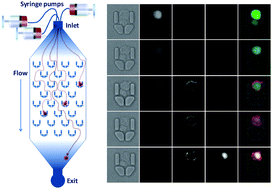Stem cells hold great promise as a means of treating otherwise incurable, degenerative diseases due to their ability both to self-renew and differentiate. However, stem cell damage can also play a role in the disease with the formation of solid tumors and leukaemias such as chronic myeloid leukaemia (CML), a hematopoietic stem cell (HSC) disorder. Despite recent medical advances, CML remains incurable by drug therapy. Understanding the mechanisms which govern chemoresistance of individual stem cell leukaemias may therefore require analysis at the single cell level. This task is not trivial using current technologies given that isolating HSCs is difficult, expensive, and inefficient due to low cell yield from patients. In addition, hematopoietic cells are largely non-adherent and thus difficult to study over time using conventional cell culture techniques. Hence, there is a need for new microfluidic platforms that allow the functional interrogation of hundreds of non-adherent single cells in parallel. We demonstrate the ability to perform assays, normally performed on the macroscopic scale, within the microfluidic platform using minimal reagents and low numbers of primary cells. We investigated normal and CML stem cell responses to the tyrosine kinase inhibitor, dasatinib, a drug approved for the treatment of CML. Dynamic, on-chip three-color cell viability assays revealed that differences in the responses of normal and CML stem/progenitor cells to dasatinib were observed even in the early phases of exposure, during which time normal cells exhibit a significantly elevated cell death rate, as compared to both controls and CML cells. Further studies show that dasatinib does, however, markedly reduce CML stem/progenitor cell migrationin situ.


 Please wait while we load your content...
Please wait while we load your content...